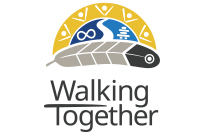Page Content
The ATA’s Walking Together project is alive and well and has a few new wrinkles in the works for 2020–21.
After starting as a short-term initiative funded by the provincial government following the final report of the Truth and Reconciliation Commission, Walking Together became a permanent part of the ATA last year thanks to funding approval by delegates at the 2019 Annual Representative Assembly (ARA). The Walking Together branding can be found on the majority of the ATA’s Indigenous education platforms, such as workshops and teaching resources.
The program’s work continues to be delivered primarily through facilitators in the ATA’s Professional Development (PD) program area. There are currently 12 Indigenous education facilitators, but work is underway to add six more, as approved at the 2020 ARA.
The positions are assigned regionally, ensuring that facilitators are fanned out across the province rather than being clustered in urban areas.

Melissa Purcell, (she/her), executive staff officer, Indigenous education
|
Melissa Purcell, the staff officer who leads the ATA’s Indigenous education programs, likes to refer to the ATA’s continuing work on Indigenous education as the legacy of the Walking Together project.
“A huge part of that project were the Walking Together consultants, the numerous First Nations, Métis and Inuit Elders and Knowledge Keepers we engaged — you know, lots of community involvement,” Purcell said. “Part of our practice is to acknowledge where we received the teachings from, and it’s important we continue to do that across the province.”
Connecting cultures
Purcell said an important part of the Indigenous education facilitator’s role is to help guide teachers to go deeper into Indigenous topics, to help teachers relate to Indigenous peoples, teachings, language and the land. Facilitators connect teachers with local First Nations, Métis, and Inuit Elders, Knowledge Keepers and people within their community.
“If a teacher says ‘I want to foster a relationship with an Elder to learn more about smudge teachings,’ that facilitator would help them get in touch with local Elders or Knowledge Keepers,” said Purcell.
She points out that the job is much more than just providing a phone number or email. There is cultural protocol and etiquette that’s involved whenever asking Elders for support with cultural teachings. Facilitators help teachers navigate the cultural complexities of situations like offering tobacco, honoraria or how to host an Elder.
New resources on the way
Under the Walking Together: Education for Reconciliation umbrella, the ATA’s Stepping Stones resource bank will continue to grow this year. Three new resources are expected within the next few weeks. One is on the Métis Nation of Alberta, a second is on policies of assimilation, while the third focuses on the forced relocation of Indigenous peoples in Canada.
In addition to the two new Stepping Stone resources, PD is hoping to field test two new workshops throughout the upcoming year. One workshop will focus on anti-Indigenous racism while the other will include content related to the final report of the National Inquiry into Missing and Murdered Indigenous Women and Girls. Purcell said she wants to connect the issue to education and how it can be applied within the classroom.
“I feel incredibly grateful we have support of the membership,” she added, “that they want more support and more resources and more workshops on Indigenous education.” ❚
|

More information on the Walking Together project can be found via the ATA website at teachers.ab.ca > My ATA > Professional Development > Indigenous Education and Walking Together
|
